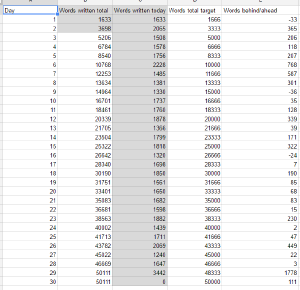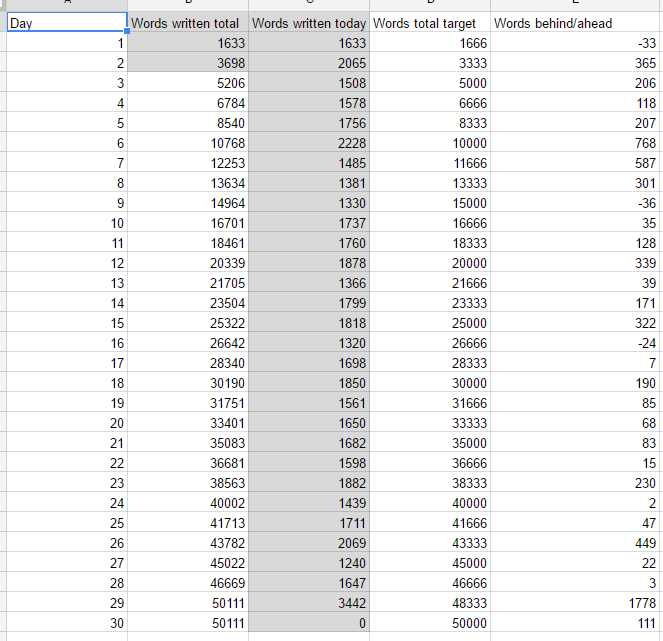As I recall, today was at least my fifth Nanowrimo attempt; the first one was sometime before 2003 (I would guess it was in 2000 or 2001 before I graduated from college), the second one was in 2003, then 2006, then 2011, then finally the fifth one this year. My best prior attempt was back in 2011, when I made it up to 22,000+ words.
At just around 1am on the early morning of November 30th this year, I beat that record and have won Nanowrimo for the first time. I wrote more than 3,000 words from the last hours of the 29th up to the early hour of the 30th to push across the target count. According to the official word count tool on the site, I am at 50,135 words. The novel is terrible and it will never see the light of day as it is, but it has a start, it has a plot that it follows to the end, and it has an ending which while I’m not totally happy with, is good enough for a first draft.

Getting the obvious question out of the way first: no, I’m not going to release or publish the draft as it is. Way too many problems (more on that below), even though I tried to resolve things and tie them together best as I can. The nature of nanowrimo itself means that novels written for this purpose tend to be all kinds of messy, since you are not encouraged to rewrite previously written parts. At some point I will revisit this story and attempt to rework it into something better, but for now, I’m just happy to be done and will set it aside for now.
I think there are two reasons that this attempt succeeded where previous attempts had failed: First is that I came in significantly more prepared this time than my last attempts since I actually had a story idea and an outline for what I had in my head. Granted, I had to expand and add upon that outline multiple times, but at least I had something decent to start with. Second reason is that I believe I have significantly more self-discipline this time around, as a result of all of the daily habits I’ve taken up this year. I’m less likely to skip writing for a day due to laziness or being sad about world events or whatever, and more likely to drag myself out of bed to force myself to write some number of words for the day.
What struck me about the process is the number of parallels I could draw to software development:
- In software development, you need some sort of specifications or requirements to get going, and work proceeds smoothly the more detailed those specs are. When writing, having your outline and a vision of what happens in the story makes writing go by faster and more smoothly; when I get to parts that I have not planned out in detail I tend to flounder about until I can figure it out.
- Scope creep happens in writing too! My initial story idea was about a wandering sell-sword who passes by a small rural village and gets caught up in trying to resolve a “curse” that the villagers believe they are under. But at the outline stage I already knew it was too short (I couldn’t list enough scenes), so I expanded it a bit with a backstory that the protagonist was actually a fugitive and although he stops to help the villagers with good intentions, he draws them into his troubles when his pursuers chance upon him. As I wrote, I realized I needed even more details so I found myself weaving a more detailed plot about how he became a fugitive because he had unwittingly uncovered a political plot and had to escape with a certain artifact, which led to me detailing the back story of that artifact that turned into a mythos and history for the world the story was set in. Yup, it escalated pretty quickly.
- There’s a famous quote in software development that mentions one of the difficult problems as naming, and in writing, the same applies! I made liberal use of online random name generators for characters, cities, continents, etc. Midway through, I had to rename a couple of the main characters (lots of find and replace) and three timesI even renamed the main continent on which the story takes place, and I’m still not happy with what I have now.
- When writing large programs, I have a tendency to code the interesting bits first, then I’m left with a whole lot of drudgery such as boilerplate code or CRUD screens to do. Writing turns out to be the same, I wrote a lot of the interesting scenes first then deferred those I had trouble with or hadn’t figured out too well. It led to some problems; if you saw my draft you would notice some points where the story jumps forward abruptly leaving the reader to infer what had happened in between. Those were points where I had difficulty deciding how to get from point A to point B and just decided to write the other end first and try to work backwards, but never did figure it out completely.
- When programming, you can get too engrossed in a particular part of the program such that you put too much work into it which turns out to be unnecessary. In this draft, I enjoyed writing the world’s mythos and back story a bit too much, I kind of set the framework for a series of stories in the same world, and some of the back story parts are better off told in succeeding books since they are not especially relevant to the plot of this one.
Some other non-programming related notes:
- Towards the start, I felt like I was writing too much dialogue (might have been a result of reading too many Brian Michael Bendis comics) and later on I adjusted by writing more prose. This also helped for some difficult moments, for example I had two characters where I wanted to get them into a shouting match but had trouble writing the dialogue to develop it, so instead I just used prose to describe the increasing tension of their discussion.
- I made a silly decision early on to give the main character a speech affectation – he spoke in an archaic formal speech that was unusual for people in that region. It wasn’t a big deal and there was a story reason for it and it made him feel more distinctive, but it also meant I had to be more careful later on when writing dialogue for the character.
- Making up some elements on the fly kind of got in my way; about 70% through I suddenly had the bright idea that a “good” character I had alluded to in an earlier flashback would actually be the “big bad” who was behind the conspiracy all along. This was fine, but it led to some plot acrobatics where I had to engineer some complicated scenarios to justify my decision, and it meant my ending had to be a bit different from what I had previously wanted.
Having the daily quota was a strange experience. I was over quota most days, but also had some days where I was under quota. I found myself preferring to write in scenes, such that I won’t switch scenes within the same day, so some scenes felt like they were a bit too long because I was stretching them to fit in the writing quota for that day. And the quota also meant that whenever I was already over quota for a certain day but still had a clear idea of what to write, I had the option to stop and just “bank” those thoughts and continue the scene the next day. I never tried to pull too far ahead (except for the last two days); I figured I needed to get used to the rhythm of writing a set amount per day, instead of in bursts as I might have done in previous attempts.
I tracked my daily progress via a spreadsheet (word counts are using Google Docs’ built-in word count tool. The nano site’s word count tool had a different final count for some reason.)

All in all, I’m happy with the experience, despite not being entirely happy with my own output. I learned a lot and now have a better sense of how long fifty thousand words actually is and what size a novel-size story really should be. I now have some idea of how quickly I can write, and how much “writing energy” I can spare for a day (I was actually in danger of falling behind on regular blogging at one point because I spent all my “writing energy” on nanowrimo.) I say “writing energy” because I find that I draw from a different pool of energy as compared to say, when I’m sketching. It’s probably not super indicative – I could probably have been writing more each day if I spend more time in preparation and outlining.
I will attempt to write more in 2017, but maybe not yet on revising this particular work. I have some other ideas I’m thinking of visiting, not necessarily for nanowrimo. I don’t know if this will lead anywhere – I still have no idea if I could really write fiction for a living for example – but I think at least trying to write more will be a worthy endeavor to explore.


See Also